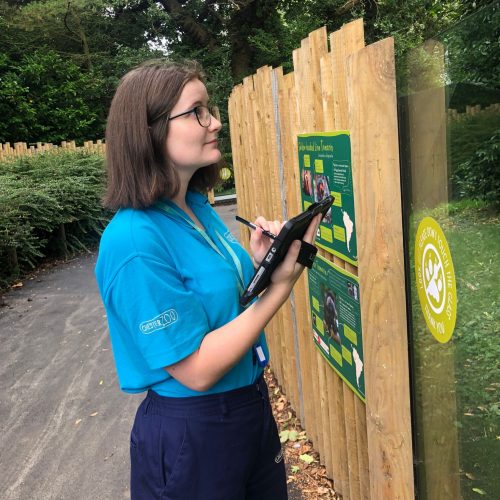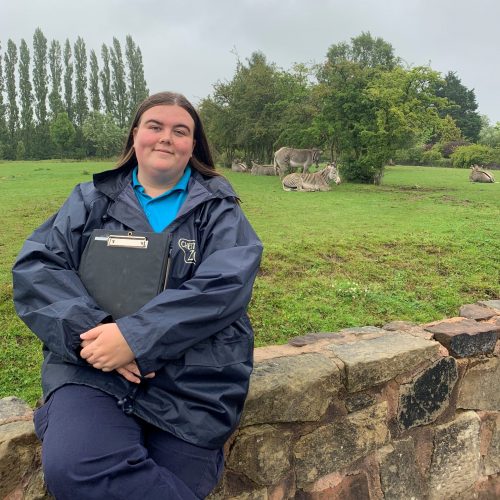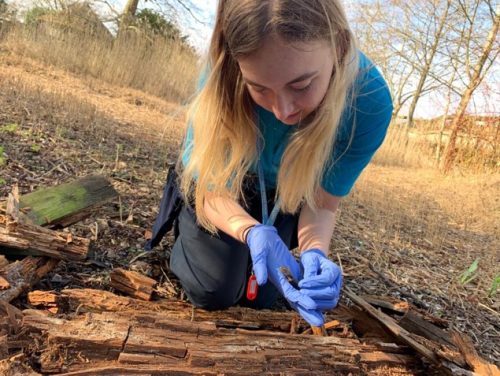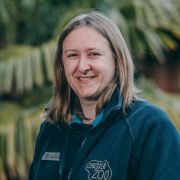At the end of a long journey through the 2020-21 academic year, our Industrial Placement Students reflect on their growth and plans for the future.
A whole year ago we took a quick look into the lives of our 2020 Industrial Placement Students as they were beginning their journey as part of the Chester Zoo Conservation & Science Teams. It’s been a tumultuous time with the zoo endeavoring successive lockdowns and limits on our visitor income, and yet despite all of this each of our six students have emerged on the other side with newfound rich skillsets with which to complete their studies and forge their careers in the years ahead.
We asked each of them to reflect on the year, the contributions they’ve made to our conservation efforts, and how they’ve changed as people since the beginning.
Lucy Settle, Nottingham Trent University
Social Science Placement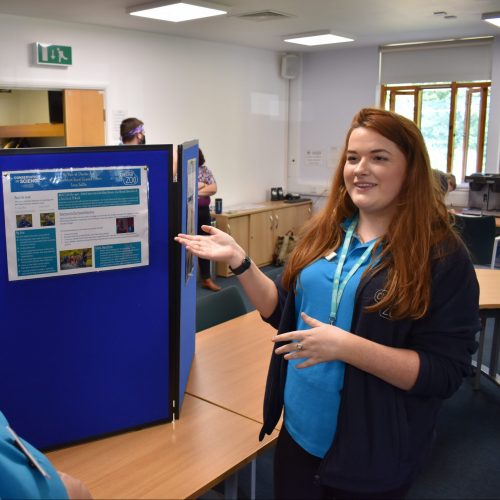
“My year at Chester zoo has been both incredible and insightful. Working in the Conservation Social Science team with both Andy and Greg has presented so many fantastic opportunities; I have worked on various projects ranging from studies looking at connection to nature and the role of zoos, to the effectiveness of zoo led education programmes.
I’ve have had the honour to contribute to and act as a tutor on the European Association of Zoos & Aquaria (EAZA) education evaluation workshop, presented a poster at the British Association of Zoos & Aquaria (BIAZA) research conference and conducted my own research to produce a publication evaluating the role of virtual learning in zoo based education in a post COVID-19 world.
Overall, this placement has offered so many amazing opportunities that have not only allowed me to improve on my transferable skills but have also prepared me for my final year of study and hopefully a career in conservation within the realms of social science.”
Emma McKinney, Queens University Belfast
Behaviour & Welfare Placement
“During a fantastic placement year at Chester Zoo I have worked with numerous iconic species for behavioural observations and reports, such as lions, elephants and orangutans to list just a few. These included topics such as habitat use, visitor effect, post moves and enrichment evaluations. A range of literature reviews were also completed which helped to improve my research and writing skills.
I’ve worked on many different projects but my highlight was researching the effect of visitor presence on Asian elephants which was presented to BIAZA. I feel like I’ve achieved a lot during my time here and that I have learnt many valuable skills such as data collection and analysis, which will be invaluable to me in future careers and the continuation of my academic life.
My internship has allowed me to see the remarkable people that work at Chester Zoo and all of the invaluable work that they do. I feel like this has affected my future career ambitions by showing me that I definitely want to work in conservation and to contribute to preventing extinction.”
Danielle Logan, Liverpool John Moores University
Conservation Physiology Placement
“I really can’t believe this amazing experience is coming to an end! Definitely the best year of my professional career so far. Besides the obstacles over the course of the year due to COVID-19, I’ve still had the opportunity to learn so much, and feel much more at ease in a professional lab setting.
Being given the opportunity to develop new skills such as the use of enzyme immunoassays, something I would not have learnt at university, has meant I now understand further the current and innovative methods in conservation. I can’t wait to take these skills I have learnt with me to university to take on my final year, and hopefully a masters in the near future!
Working with Katie, Becky and John has truly been an honour, from getting their professional advice to working with them on a project I’d go on to present at this years virtual BIAZA research conference. I don’t think I can ever thank them enough. This placement has made me excited for the future, and working in a career that will hopefully allow me to continue preventing extinction!”
Eve Bond, Queens University Belfast
Behaviour & Welfare Placement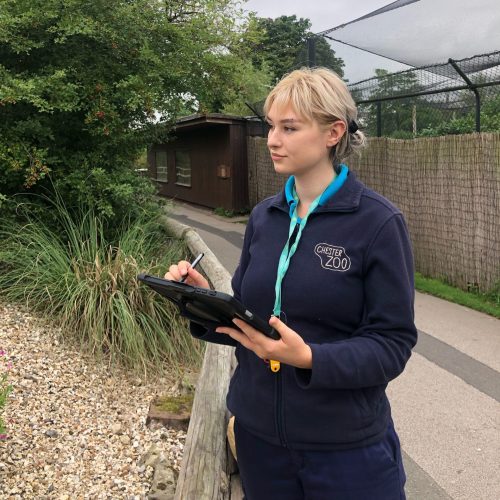
“During my internship I have been able to work on several different behaviour and wellbeing projects across the zoo, including evaluating enrichment devices, studying the impact of habitat transfers, and the effect that lockdown closures have had on animal behaviour, even having the opportunity to share some of these results at the annual BIAZA research conference, which was definitely a highlight.
The placement has also had a massive impact on my self-confidence by developing my skills in data collection and manipulation, as well as critical analysis of scientific resources. I will be going into my final year of university with far more knowledge than I had before this year.
I’ve also been lucky enough to meet so many amazing people throughout the zoo, something that has opened my eyes to the number of possible job roles within the sector. This has made me even more keen to pursue a career in conservation, knowing that there is a variety of different positions that would interest me.”
Morwenna Hope, University of Exeter
Conservation Physiology Placement
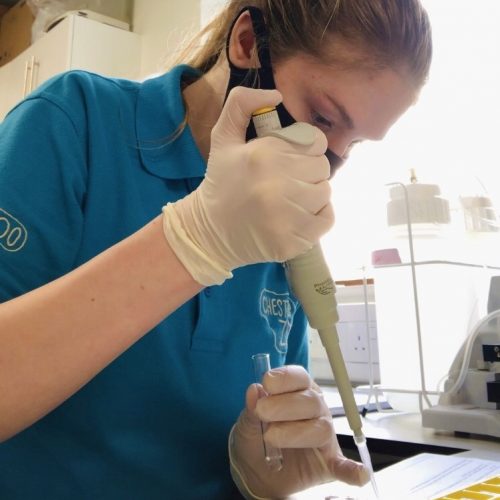
“By being lucky enough to work at the UK’s only wildlife endocrinology laboratory, I’ve been able to greatly expand upon my knowledge of physiology through the analysis of hormones using enzyme-immunoassays, and learning about its application to ex-situ animal management, such as determining cyclicity, detecting pregnancies and developing effective contraceptives. Getting to see the latest black rhinoceros calf, Kasulu, up close further put into perspective how this research field contributes to conservation. Black rhinoceroses were a prominent feature of my internship, having conducted a project investing thyroid hormones in the species and creating an accompanying scientific poster which I was fortunate to present at a BIAZA research conference.
My self-confidence has grown spectacularly this year, making me realise I am capable of doing much more than I’d previously though, whether that be writing literature reviews or identifying each individual of a banteng herd! I have also learned that laboratory work is not always a plain-sailing experience, it takes perseverance, and working with faecal samples especially isn’t the most ‘glamourous’ of jobs at times. Despite that, this placement has made me more determined to pursue a research career in wildlife conservation, and has shown me how endocrinology studies can go hand-in-hand with those in my other fields of interest, epidemiology and genetics.
As well as my amazing managers, fellow science interns and everyone else I’ve met along the way, I am also going to miss hearing the lions roaring from my accommodation – a daily reminder of the amazing environment I’ve been able to work in!”
Caitlin Cross, University of Salford
Field Programmes Placement
“My role as a Field Programmes intern has been incredibly varied. I have had the opportunity to work alongside the site ecologist, taking part in annual monitoring counts of the large great crested newt population on site, assisting with the badger vaccination programme, establishing a new small mustelid project, and monitoring the badger clans using camera trapping.
A particular highlight of my experience was capturing the first emergence of 3 fox cubs from their den on site. I had seen that the entrance looked active and moved a camera to focus on the area. The footage was then used by the PR team on social media, and provided better insight into their development.
I now have a better understanding of what is needed to progress with my career, as well as an improved skill set. I intend to continue working with UK native species and will now work towards getting the relevant protected species licenses.”
“All of our placement students have excelled during their time with the Science and Field Programmes Teams. They’ve have had a difficult year trying to complete projects during a pandemic and have risen to the challenge, and every single one of them has contributed valuable work to the sector exemplified by their presentations at the BIAZA Research Conference in July 2021. Our teams have ensured that, even during a pandemic, placement students received excellent training which has provided them with an array of skills to take into their future careers which will aid our mission of Preventing Extinction”
Applications for our 2022-23 Academic Year Industrial Placements are now open! Learn more and apply through the links right below:
